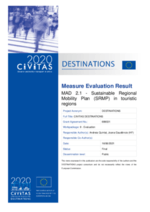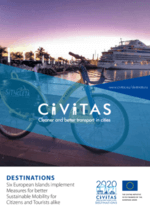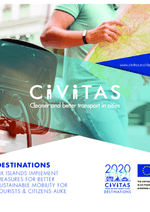
Madeira (Portugal)
Madeira Island in the North Atlantic is part of the Madeira Archipelago and the main city is Funchal. Approximately 2/3 of the island is a natural park and almost the whole island is covered by Levadas (man-made water channels with pathways). Madeira is a well-known tourist destination, that annually hosts an average of 1,6 million tourists arriving by plane and 533 thousand by cruise ship.
The Region landscape is mountainous and is characterised by narrow and steep streets. Locals and visitors deal with the lack of proper sidewalks on some streets, conditions that discourages people from walking and cycling. On the other hand, over the last years, accessibility conditions to cars were improved, which made travel by individual means more appealing. As a result, the island witnessed a significant change in the mobility patterns of residents and tourists, with a big increase of car users (from 37% to 59%) and a decrease of public transport passengers (from 27% to 21%), between 2001 and 2011.
Fast Facts
254,254 (2019)
Population
317.2 inhab./km2
Population density
Madeira after DESTINATIONS
Cleaner and more efficient public and private fleets
+ 34 new e-charging stations, 2016 to 2020;
+ 556% (from 100 to 655) of new Electric Vehicles (EV), 2016 to 2020;
- 1.276 tons of CO2, with the new 556 EV;
- 5.563 MWh in energy consumption, with the new 556 EV;
Cleaner buses: 5 mini electric, and 30 EURO VI diesel (ERDF support);More attractive public transport (PT)
+ 5% in the PT use, 2016 to 2019;
10% of total tourists’ travels were by PT in 2019;
+ 43% more students using PT, 2017 to 2019;
+ 32% of tourists and locals using PT for big events, 2017 to 2019;Safer and more secure public spaces
+ 23% of PT bus stops with shelters, 2017 to 2020;
+ 26% of PT bus stops with sidewalks, 2017 to 2020;
+ 793 passengers per working day with better accessibility in PT bus stops;
- 69% road accidents in the pilot area, 2016 to 2019;
+ 191% pedestrians and the pilot area, October 2017 to January 2021;Hoteliers and local businesses as ambassadors of sustainable mobility
Established cross-sector business partnerships to create win-win agreements to promote PT providing discounts and advantages to PT users;Outlined strategic Plans – SUMP-ARM (Sustainable Urban Mobility Plan for the Autonomous Region of Madeira) and SULP (Sustainable Urban Logistic Plan) – to be undertaken over the long-term to promote sustainable mobility and improve the freight operations.
Future activities
The local partners will continue to work together beyond DESTINATIONS, building on the legacy of the activities carried out, scaling-up and exporting the successful solutions.
The strategic actions included on the SUMP and SULP are part of the political agenda of the municipalities and will be implemented along the next years. The local partners will continue the awareness actions to promote sustainable mobility involving schools’ communities, tourism sector and local businesses; will continue the improvement of the technological systems, including the ticketing system, to provide better information to passengers; and provide improved information for better mobility planning, for residents and tourists.




















